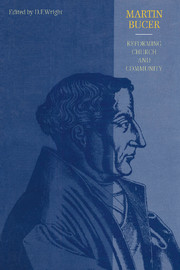Book contents
- Frontmatter
- Contents
- Notes on contributors
- List of abbreviations
- Introduction
- 1 Martin Bucer and the Old Church
- 2 The relation between church and civil community in Bucer's reforming work
- 3 Bucer's influence on Calvin: church and community
- 4 The church in Bucer's commentaries on the Epistle to the Ephesians
- 5 Church, communion and community in Bucer's commentary on the Gospel of John
- 6 Eucharistic communion: impulses and directions in Martin Bucer's thought
- 7 Martin Bucer and the ministry of the church
- 8 Infant baptism and the Christian community in Bucer
- 9 Bucer's ecclesiology in the colloquies with the Catholics, 1540–41
- 10 The Strasbourg Kirchenpfleger and parish discipline: theory and practice
- 11 Ecclesiological motifs behind the creation of the ‘Christlichen Gemeinschaften’
- 12 Martin Bucer in England
- 13 Martin Bucer and the Englishing of the Psalms: pseudonymity in the service of early English Protestant piety
- Bibliography
- Biblical index
- Index of Bucer's works
- Index of modern authors
- General index
9 - Bucer's ecclesiology in the colloquies with the Catholics, 1540–41
Published online by Cambridge University Press: 22 September 2009
- Frontmatter
- Contents
- Notes on contributors
- List of abbreviations
- Introduction
- 1 Martin Bucer and the Old Church
- 2 The relation between church and civil community in Bucer's reforming work
- 3 Bucer's influence on Calvin: church and community
- 4 The church in Bucer's commentaries on the Epistle to the Ephesians
- 5 Church, communion and community in Bucer's commentary on the Gospel of John
- 6 Eucharistic communion: impulses and directions in Martin Bucer's thought
- 7 Martin Bucer and the ministry of the church
- 8 Infant baptism and the Christian community in Bucer
- 9 Bucer's ecclesiology in the colloquies with the Catholics, 1540–41
- 10 The Strasbourg Kirchenpfleger and parish discipline: theory and practice
- 11 Ecclesiological motifs behind the creation of the ‘Christlichen Gemeinschaften’
- 12 Martin Bucer in England
- 13 Martin Bucer and the Englishing of the Psalms: pseudonymity in the service of early English Protestant piety
- Bibliography
- Biblical index
- Index of Bucer's works
- Index of modern authors
- General index
Summary
Reading the documents concerning the negotiations between Catholics and Protestants, drawn up in the course of the years 1540 and 1541, and realizing that many of them were compiled partly or in full by Bucer, one can but wonder at the versatility of the Strasbourg theologian and organizer. In one way or another all these papers deal with the German church, its structure, doctrines, ceremonies and polity. Comparing them with Bucer's major works on ecclesiological themes, his church orders and the reality of the Strasbourg church in his time means at first glance looking at two completely different designs. It is therefore not surprising that in the studies of Bucer's ecclesiology and of his activities in the field of church organization these documents are given little attention. Furthermore, the majority of Bucer's manuscripts and published writings on the negotiations are not yet available in modern editions. The temptation is strong to ignore them, with the excuse that in any case this whole affair could contribute to our knowledge only of the diplomat and negotiator Bucer, not to that of Bucer the theologian. In this respect there is a striking parallel to Bucer's role in the sacramentarian controversy, the difference being that in the latter field this view was abandoned in favour of the recognition that Bucer's activities were based on a firm theological conviction.
- Type
- Chapter
- Information
- Martin BucerReforming Church and Community, pp. 107 - 121Publisher: Cambridge University PressPrint publication year: 1994



